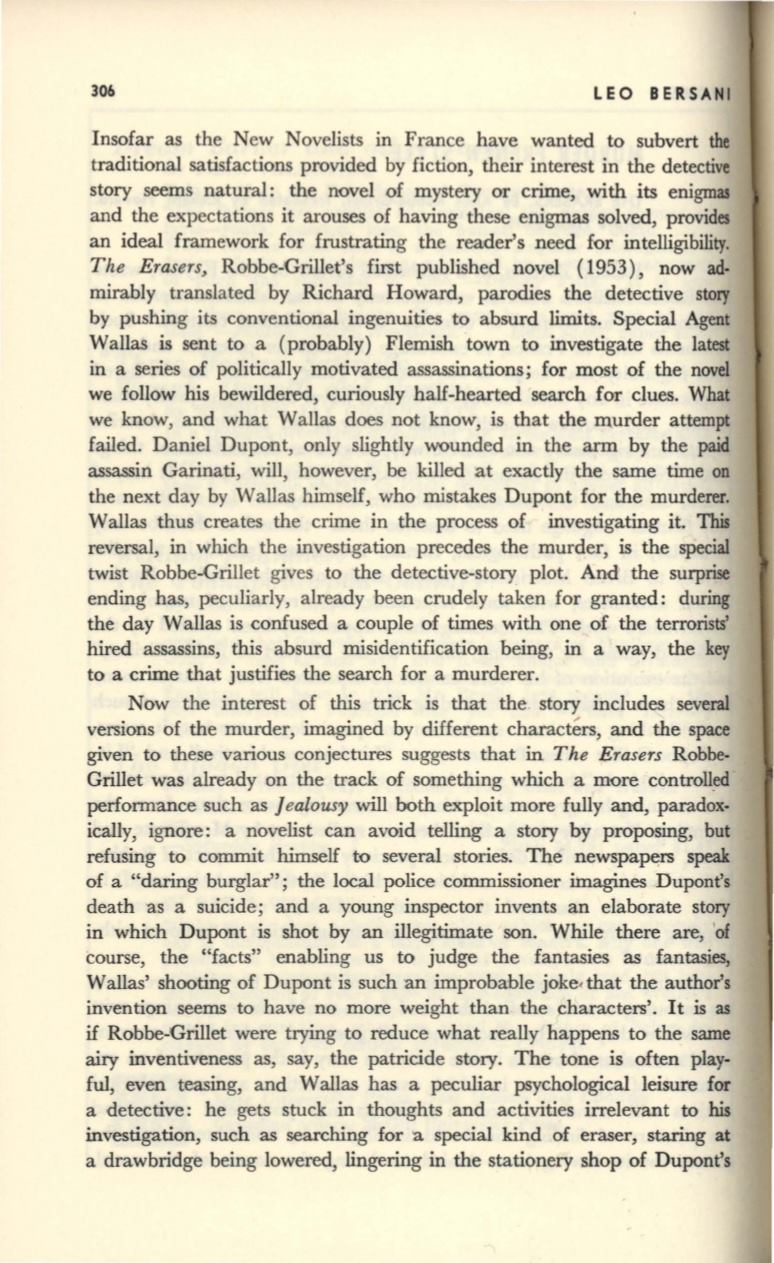
306
LEO BERSANI
Insofar as the New Novelists in France have wanted to subvert
the
traditional satisfactions provided by fiction, their interest in the detective
story seems natural: the novel of mystery or crime, with its enigmas
and the expectations it arouses of having these enigmas solved, provides
an ideal framework for frustrating the reader's need for intelligibility.
The Erasers,
Robbe-Grillet's first published novel (1953), now
ad–
mirably translated by Richard Howard, parodies the detective story
by pushing its conventional ingenuities to absurd limits. Special
Agent
Wallas is sent to a (probably) Flemish town to investigate the latest
in a series of politically motivated assassinations; for most of the novel
we follow his bewildered, curiously half-hearted search for clues. What
we know, and what Wallas does not know, is that the murder attempt
failed. Daniel Dupont, only slightly wounded in the arm by the paid
assassin Garinati, will, however, be killed at exactly the same time on
the next day by Wallas himself, who mistakes Dupont for the murderer.
Wallas thus creates the crime in the process of investigating it.
This
reversal, in which the investigation precedes the murder, is the special
twist Robbe-Grillet gives to the detective-story plot. And the surprise
ending has, peculiarly, already been crudely taken for granted: during
the day Wallas is confused a couple of times with one of the terrorists'
hired assassins, this absurd misidentification being, in a way, the key
to a crime that justifies the search for a murderer.
Now the interest of this trick is that the story includes several
versions of the murder, imagined by different characters, and the space
given to these various conjectures suggests that in
The Erasers
Robbe–
Grillet was already on the track of something which a more controll,ed
performance such as
Jealousy
will both exploit more fully and, paradox–
ically, ignore: a novelist can avoid telling a story by proposing, but
refusing to commit himself to several stories. The
newspap~rs
speak
of a "daring burglar"; the local police commissioner imagines Dupont's
death as a suicide; and a young inspector invents an elaborate story
in which Dupont is shot by an illegitimate son. While there are, 'of
course, the "facts" enabling us to judge the fantasies as fantasies,
Wallas' shooting of Dupont is such 'an improbable joke, that the author's
invention seems to have no more weight than the characters'. It
is
as
if
Robbe-Grillet were trying to reduce what really happens to the same
airy inventiveness as, say, the patricide story. The tone is often play–
ful, even teasing, and Wallas has a peculiar psychological leisure for
a detective : he gets stuck in thoughts and activities irrelevant to
his
investigation, such as searching for a special kind of eraser, staring at
a drawbridge being lowered, lingering in the stationery shop of Dupont's


